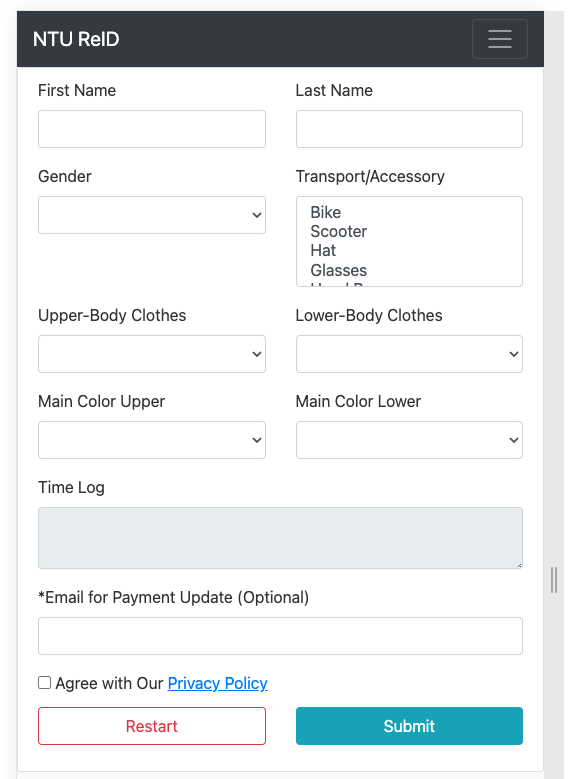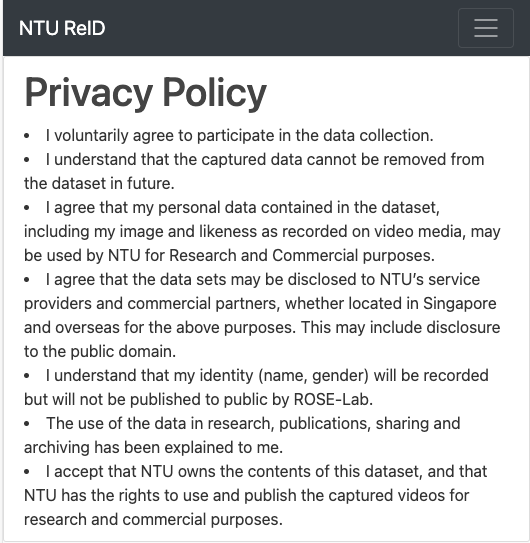NTU-Outdoor-38 Person ReID Dataset
The NTU-Outdoor-38 dataset was collected by the Rapid-Rich Object Search (ROSE) Lab, Nanyang Technological University (NTU), Singapore. This initiative was the result of a collaboration between the ROSE Lab and the Defence Science and Technology Agency (DSTA) of Singapore.
NTU-Outdoor-38 is a Person Re-identification (ReID) dataset collected around the outdoor campus grounds of NTU, spanning 38 non-overlapping cameras. Due to the wide area of coverage, the distribution of foot traffic varies considerably across the multi-camera system and presents a challenging ReID task with high levels of inter-camera data imbalance. Standard baseline solutions exhibit corresponding performance imbalances, with “less-data” cameras underperforming the “more-data” cameras.
Sample Images from NTU-Outdoor-38
|
|
|
|
|
|
NTU-Outdoor-38 consists of images from actual surveillance cameras mounted on lamp-posts, better highlighting the viewing angles and imbalances inherent in real-world networked camera systems. It consists of outdoor scenes with large changes in viewpoint, illumination, and resolution that manifest even within individual wide-angle cameras. Our dataset boasts significantly more cameras than other popular benchmarks and also comes with 40 additional categorical attributes annotated by participants.
Participants in NTU-Outdoor-38 have provided informed consent to the use of their images for academic purposes. Furthermore, the faces of these subjects have been blurred. All participants have to manually aggree with our privacy policy before participating our dataset collection. Our privacy policy screenshot from mobile app is shown below:


NTU-Outdoor-38 captures the inter-camera performance imbalances present in real-life camera networks and serves as an excellent test-bed to further study this problem. To the best of our knowledge, it is the only publicly available Person ReID dataset collected from over 30 cameras.
Dataset Statistics
The following table presents a breakdown of the dataset attributes of NTU-Outdoor-38:
|
Property |
Value |
|
Train Images |
23018 |
|
Query Images |
1386 |
|
Gallery Images |
23943 |
|
Total Images |
48347 |
|
Train Appearance IDs |
274 |
|
Query Appearance IDs |
227 |
|
Gallery Appearance IDs |
275 |
|
Total Appearance IDs |
549 |
|
Cameras |
38 |
|
Binary Attributes |
40 |
|
Camera Type |
Surveillance |
|
Height |
Lamp Post |
|
Detector |
YOLOV3 |
Dataset File Structure
|
Folder |
Description |
|
bounding_box_train |
The training images. This folder contains the images from 274 unique appearances. |
|
query |
The query images. Each of them is from different identities and appearances in different cameras. |
|
bounding_box_test |
The gallery images. We retrieve a query from this image pool. |
Image File Naming Rules
Given an example image file: "9_2018-10-24_16h57m44s_G1849_134_228_2070_0_female_black_blue_t-shirt_short_backpack_high.jpg", tokenize the file name using the underscore “_” as separator. The following table describes each token in order of appearance as applied to our example:
|
Index |
Description |
|
0 |
"9" is the camera id |
|
1 |
"2018-10-24" is the date |
|
2 |
"16h57m44s" is the start time for video recording during data collection |
|
3 |
"G1849" is the record id in our system |
|
4 |
"134" is the person id (out of 274 ids) |
|
5 |
"228" is the appearance id. (out of 549 appearances) |
|
6 |
"2070" is the frame number (video recorded at 30 frames per second) |
|
7 |
"0" is the person index among all people detected within this frame |
|
8 |
"female" is the gender of the person |
|
9 |
"black" is the top clothing color |
|
10 |
"blue" is the bottom clothing color |
|
11 |
"t-shirt" is the top clothing type |
|
12 |
"short" is the bottom clothing type (shorts) |
|
13 |
An unfixed number of additional attributes (such as “backpack”) follow… |
|
14 |
The last attribute is the annotation confidence, “high” |

_hall11-dance_yes.png)
_scbe-ocip_no.png)
.png)
.png)
.png)